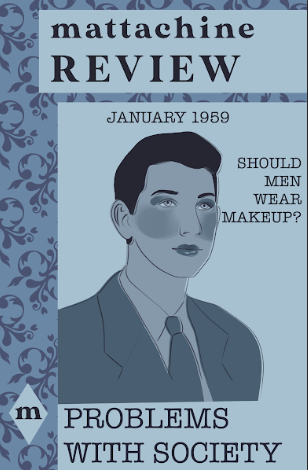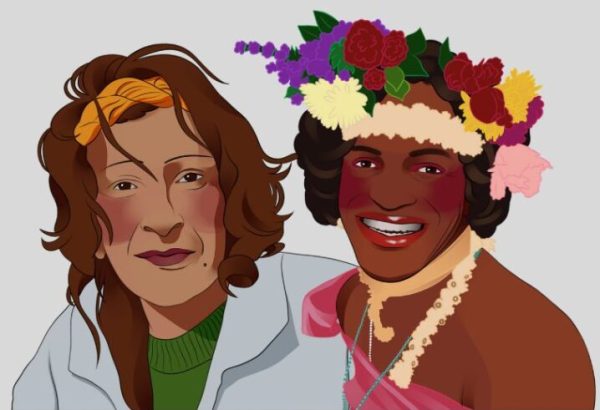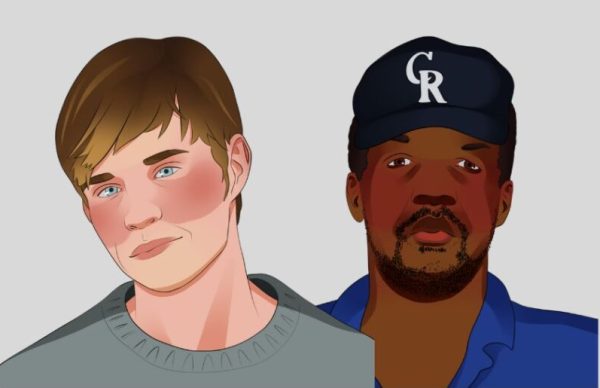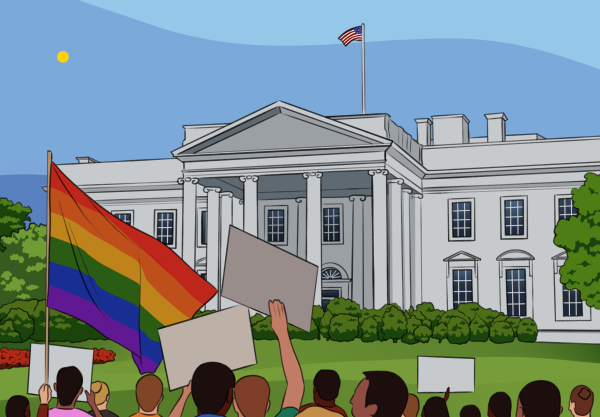LGBTQ+ History Month, which takes place Ocr. 1-31, is a time to celebrate the achievements and milestones in the LGBTQ+ community. Several events and movements impacted this community, such as the passage of the 2009 Hate Crimes Prevention Act. “While the act only included protections for acts of violence, not verbal ones or perceived threats, it provided more funds and resources for federal authorities to investigate hate crimes,” Webmaster Lea D’Angelo wrote. Graphic by Lea D’Angelo, illustrations by Kimberly Sanabria-Amaya
Webmaster Lea D’Angelo discusses notable moments in LGBTQ+ history in honor of LGBTQ+ History Month which takes place Oct. 1-31.
Mattachine Society

An Illustration depicts the cover of the Mattachine Review. Illustration by Kimberly Sanabria-Amaya
Originally called the Mattachine Foundation, this organization was founded in 1950 by a group of Communist leftists, including Harry Hay and Dale Jennings in Los Angeles, California. The association was founded during a time of LGBTQ+ activism known as the Homophile Period and focused on giving gay men spaces for group discussion.
The original leaders were eventually kicked out once their political affiliations were discovered by members, none of whom were connected with the Communist Party. However, the society continued, moving to San Francisco and creating “The Mattachine Review”, a newsletter containing scientific studies on topics related to homosexuality as well as poems, essays and editorials relating to the homosexual experience.
Stonewall Riots

An illustration depicts Sylvia Rivera (left) and Marsha P. Johnson (right), both of whom were prominent figures in the Stonewall Riots and the fight for LGBTQ+ rights. Illustration by Kimberly Sanabria-Amaya
Raids of gay bars and regulations on the gatherings of individuals in the LGBTQ+ community were ever-present during the 1960s across the U.S. When police entered the Stonewall Inn, a popular gay bar in New York City, on June 28, 1969, they were met with resistance from patrons.
As the night progressed, the police began to manhandle individuals and use violence as a way to get them to cooperate. Among these customers were transgender women of color, Marsha P. Johnson and Sylvia Rivera, both of whom resisted the police and threw items at the officers to get away. These riots lasted for six days and were a catalyst event in the fight for LGBTQ+ rights.
HIV/AIDS outbreak

A bar graph depicts the number of deaths caused by the HIV/AIDS outbreak in the U.S. between 1980 and 2020, according to the Global Burden of Disease. Graphic by Kimberly Sanabria-Amaya
The first official report of Acquired Immunodeficiency Syndrome (AIDS) in the U.S. from the government came in June of 1981 when it was announced that five homosexual men had been diagnosed and two of them had died of the type of pneumonia associated with the disease. The epidemic spread, and over 12,000 Americans died before former U.S. President Ronald Reagan publicly said the word “AIDS” for the first time in 1986. By then, disdain for the LGBTQ+ population was widespread, although the existence of the disease was also prominent in the hemophiliac population and injection-drug users.
Many LGBTQ+ activist groups had to step in and offer support to those infected before the government began to take action. The outbreak began to slow in the late ‘90s, but as of 2017, the epidemic had infected 77 million people and killed 35 million people worldwide.
2009 Hate Crimes Prevention Act

An illustration depicts Matthew Shepard (left) and James Byrd Jr. (right), two individuals harmed by hate-related crimes. Illustration by Kimberly Sanabria-Amaya
Passed by former U.S. President Barack Obama, this act was in recognition of two individuals who died from hate-crime incidents — Matthew Shepard, a gay man, and James Byrd Jr., a Black man killed by white supremacists, both in 1998. The act furthered protections for any acts based on sexual orientation, disability or gender identity.
While the act only included protections for acts of violence, not verbal ones or perceived threats, it provided more funds and resources for federal authorities to investigate hate crimes.
Obergefell v. Hodges

An illustration depicts protesters in front of the White House, calling for the legalization of same-sex marriage which was passed by the U.S. Supreme Court in Obergefell v. Hodges. Illustration by Kimberly Sanabria-Amaya
In 2013, a group led by Jim Obergefell, an Ohinian who had gotten married to his husband in Maryland, sued the state of Ohio for not legally recognizing same-sex marriages, which was also present in Kentucky, Michigan and Tennessee. The case came before the United States Supreme Court in 2015 and they ruled that same-sex couples must be legitimized and recognized by all states under the Due Process and Equal Protection clauses of the 14th Amendment.
This ruling and subsequent lifting of rules made it possible for same-sex couples to get married in any state in the U.S. and was a huge milestone for the LGBTQ+ community.